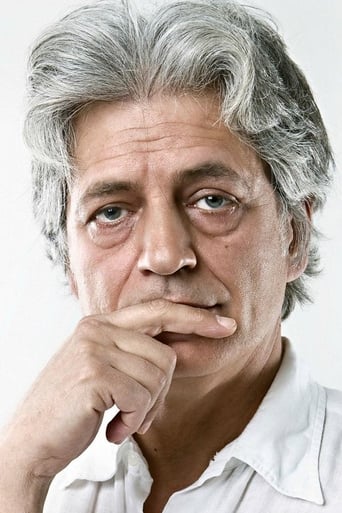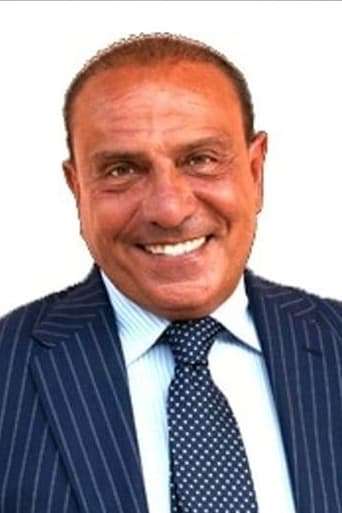SunnyHello
Nice effects though.
WiseRatFlames
An unexpected masterpiece
Lollivan
It's the kind of movie you'll want to see a second time with someone who hasn't seen it yet, to remember what it was like to watch it for the first time.
Lela
The tone of this movie is interesting -- the stakes are both dramatic and high, but it's balanced with a lot of fun, tongue and cheek dialogue.
Carlos Martinez Escalona
Others have the spoilers already, so I'll try to make this a different thing: Nunzio is almost fourteen and really handsome. He sings for TV and a record company. He plays the organ at the local parish. He's the current lover of Father Lorenzo.Lorenzo is a priest that fights the Camorra. He opens the doors of his church for the ones who need it.The Sanità neighbourhood is as violent as it comes.Naples is under siege by the same kind of violence the Camorra has always been praised for... the southern version of the Mafia.Capuano, who wrote and directed this and his previous film, does an amazing job. Each character has the depth needed to understand the surroundings and the sad situation of a troubled neighbourhood in one of the world's most controversial cities.He shows the power of many things that are not a standard for us, and maybe because of that, we don't understand. Examples of his Latin creativity and point of view, are the silent scenes that were shot hand-held where most of the murders are shown. The delicate way of portraying a difficult subject. The utter precision and realism of Catholic rituals with his own amendments.The underlying truth of life in Naples through brief but poignant phrases. The political situation that still runs in Naepolitan life. The words used in the songs Nunzio sings. The terribly painful reality of lives that struggle with everyday life where the "bosses" roam seldom leaving society unscathed.The really peaceful moments you can rob Naples just walking a few blocks away from downtown knowing that the sea is for you.The switching from dialect to language on the fly when you have both parties at the same table. The small talk on coffee as is in real life, everyday in Naples... and the bursting city that is always on the brink of something, under the clouds of mighty Vesubius.A film which stares inside the people who know the main character. All in all, a very Italian film with a lot to learn from. Don't miss the rest of Capuano's films!
jotix100
Father Lorenzo Borrelli's church is located in the Sanita quarter of Naples, one of the worst neighborhood in the city. Father Borrelli has seen enough death among the young people that are recruited by the Camorra, the local mafia, that is behind most of the crimes committed in Naples. This righteous man's voice speaks against all the injustices he sees stemming from the evil doings of the Camorra, yet Father Lorenzo is a man that hides a dark secret in his heart: he is gay and a pedophile.Into this milieu arrives Nunzio Pianese, a young boy in Father Lorenzo's confirmation class. Nunzio, himself, is a young man that is different from the other hoodlums running around in this dangerous part of Naples. Nunzio, who has a beautiful voice, is seen as he sings for one of the local stations; he loves interpreting those romantic ballads that are so Neapolitan.Perhaps it's inevitable that Lorenzo and Nunzio will become lovers. After all, Lorenzo has had another long term affair with the handsome Gigi, who is older now. Gigi must see in Nunzio what he went through during the times he had sex with the priest. At the same time, Father Lorenzo is never seen threatening Nunzio, as it appears their relationship is mutual.The Camorra wants to get to Father Lorenzo in any way it can. They choose to work through Nunzio because the young man is vulnerable where the priest is resolute. The priest has two strikes against him, he is opposing the local mafia, plus his homosexuality, if known, will certainly destroy his reputation, and it will mean the bad guys have won the struggle while they sideline their opponent.Antonio Capuano directed and wrote the screen play of this film. He uses a ploy to have the different characters in the movie introduce themselves giving us, the viewers, a bit of information as to where, and when they were born. This aspect doesn't do much to advance the story, something we found a bit distracting.The acting in general, by non professional actors, fits the movie well. Mr. Capuando sets the action for his film in the streets of the Sanita district. Fabrizio Bentivoglio, is basically the only known face in the large cast. Mr. Bentivoglio shows a great range, as he becomes furious against the Camorra, to a tender side one sees when he is in the company of Nunzio, who he evidently adores passionately. His scenes with Nunzio show a restraint that speaks volumes about the director of the film, Antonio Capuano, who decided not to go for cheap shots. Emanuele Gargiulo is seen as the sweet Nunzio.Antonio Capuano directed the film with an eye for detail, something that his cinematographer, Antonio Baldoni, captured Naples seamy side in all its splendor. Mr. Capuano makes us think about the role of this priest and his church in our society and how a gay man has to live in order to conform to its unspoken rules that discriminate men like Lorenzo to hide behind his role as a priest.
boyzmi
While most of the above comments pretty much describe the film, I saw one thing though, that I don't agree with. I didn't see the priest as molesting the very handsome Nunzio. They seemed to have a mutually consensual relationship. The boy went to the priests room, and is seen "flirting" with the priest at dinner. While Nunzio had a young girl friend, and spoke with friends about girls, he also seemed to care for the priest, and never tried to turn down the advances. The fact that he was not ready to cooperate with the investigation on the priest also shows me his concern for their relationship. The city street scenes and music I thought all lent to the validity of the time and place in the film. Even if the subject matter is not to ones liking, it is still an interesting film for the scenes, music, and other personalities in the film.
Havan_IronOak
In Naples a priest begins a campaign against the Camorra. He's particularly vulnerable in that he has a "relationship" with 13-year-old Nunzio an alter boy, semi orphan and talented singer. The priest in this film is both a hero in his fight against the Camorro and a villain in his abuse or molestation of Nunzio. Lest the priest be too sympathetic a character there is Gigi an older boy who apparently was the priest's last protégé who appears at the beginning of the film and complains that the priest doesn't seem to have time for him anymore. `Things change' he's told. The audience is left to judge for themselves as the priest seems to harbor no guilt about his actions and the boy says that he enjoyed the affection. This is another of those films that deal with morality at the uncomfortable border between what is rightfully the business of a society and what is better left as a private matter between consenting partners.






